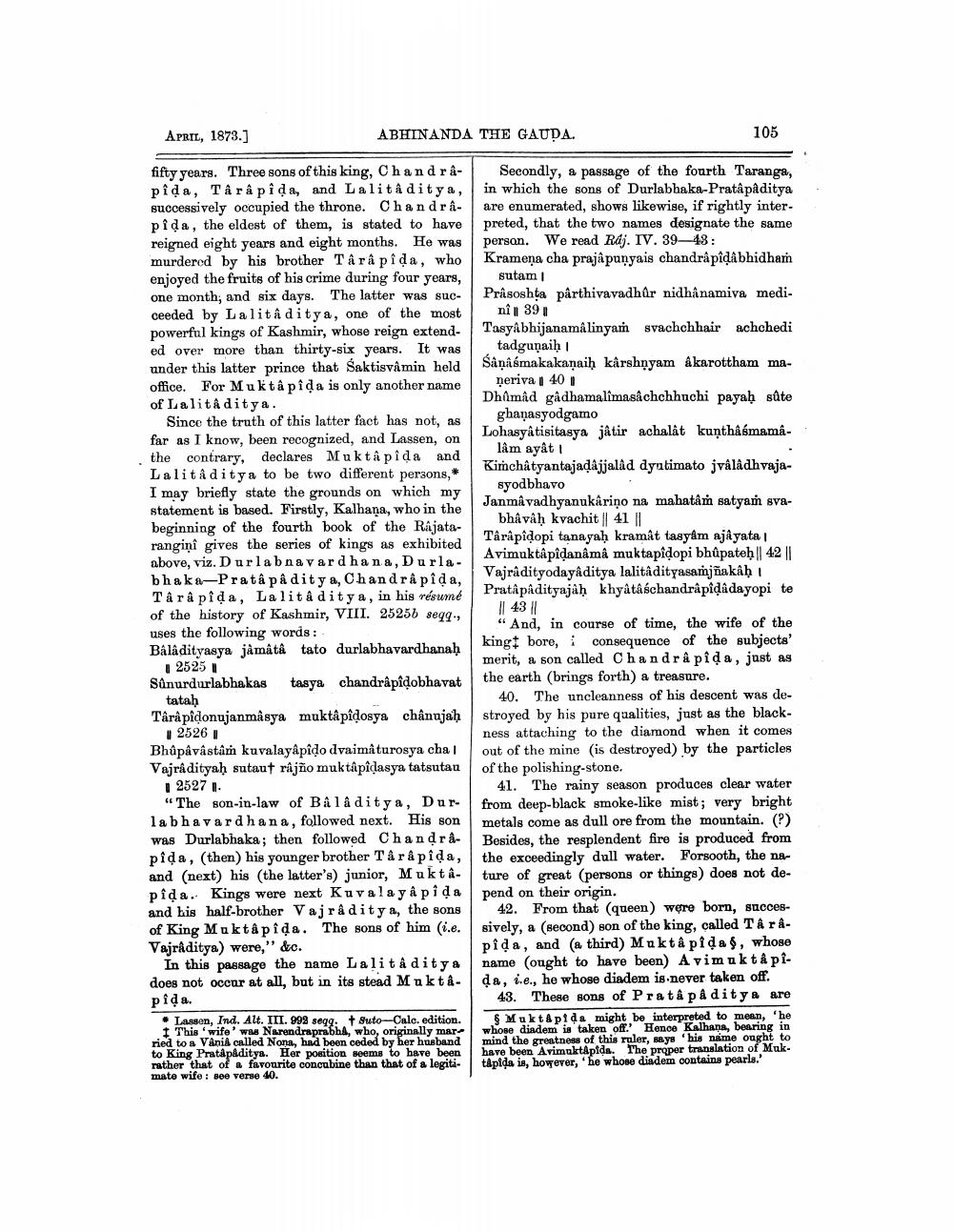________________
APRIL, 1873.]
ABHINANDA THE GAUDA.
105
fifty years. Three sons of this king, Chandra- | Secondly, a passage of the fourth Taranga, pida, Târâpida, and Lalit aditya, in which the sons of Durlabhaka-Pratâpâditya successively occupied the throne. Chandra- are enumerated, shows likewise, if rightly interpida, the eldest of them, is stated to have preted, that the two names designate the same reigned eight years and eight months. He was person. We read Ráj. IV. 39–43: murdered by his brother Târâ pida, who Kramena cha prajâpunyais chandrapîqabhidham enjoyed the fruits of his crime during four years, sutam one month, and six days. The latter was suc- Prasoshta pârthivavadhur nidhanamiva mediceeded by Lalit aditya, one of the most nî | 391 powerful kings of Kashmir, whose reign extend- TasyAbhijanamalinyam svachchhair achchedi ed over more than thirty-six years. It was tadguņaih under this latter prince that Saktisvamin held Sana makakamaih kârshṇyam Akarottham maoffice. For Muktàpida is only another name
ņeriva | 40 of Lalitâditya.
Dhimad gâdhamalîmasachchhuchi payaḥ süte Since the truth of this latter fact has not, as
ghaṇasyodgamo far as I know, been recognized, and Lassen, on
Lohasyatisitasya jâtir achalât kuņthâśmamathe contrary, declares Mukta pida and
lâm arất Lalit aditya to be two different persons,
Kimchâtyantajadájjalâd dyatimato jvâlâdhvajaI may briefly state the grounds on which my
syodbhavo statement is based. Firstly, Kalhana, who in the
Janmavadhyanukariņo na mahatâm satyam svabeginning of the fourth book of the Rajata
bhâvâh kvachit | 41 || rangini gives the series of kings as exhibited
Târâpidopi tanayah kramat tasyam ajậyata above, viz. Durlabna vardhana, Durla
Avimuktápidanamâ muktapidopi bhupateh || 42 || bhaka-Pratâ pâditya, Chand rapida,
Vajradityodayaditya lalitâdityasamjñakah Târâ pida, Lalita ditya, in his resumé Pratápadityajâh khyatâéchandrápidadayopi te of the history of Kashmir, VIII. 2525b seqq.,
|| 43 | uses the following words:
"And, in course of time, the wife of the Baladityasya jamâtâ
kingt bore, i consequence of the subjects' tato durlabhavardhanah | 2525
merit, a son called Chandrapida, just as Sunurdurlabhakas tasya chandrápidobhavat
the earth (brings forth) a treasure. tatah
40. The uncleanness of his descent was deTârâ pidonujanmâsya muktậpidosya chânujah stroyed by his pure qualities, just as the black2526
ness attaching to the diamond when it comes Bhûpâvâstâm kuvalayapido dvaimâturosya cha out of the mine (is destroyed) by the particles Vajradityaḥ sutaut rajño muktápidasya tatsutau of the polishing-stone. 1 25271
41. The rainy season produces clear water "The son-in-law of Bå laditya, Dur. from deup-black smoke-like mist; very bright labhavardhana, followed next. His son metals come as dull ore from the mountain. (?) was Durlabhaka; then followed Chandra- Besides, the resplendent fire is produced from pida, (then) his younger brother Tår&pida,
the exceedingly dull water. Forsooth, the naand (next) his (the latter's) junior, Mukta- ture of great (persons or things) does not depida. Kings were next Kuvalay Apida pend on their origin. and his half-brother Vajraditya, the sons 42. From that (queen) were born, saccesof King Muktậpida. The sons of him (i.e. sively, a (second) son of the king, called T & råVajraditya) were," &c.
pida, and a third) Mukt & pidas, whose In this passage the name Lalit Aditya name (ought to have been) Avimukt & pidoes not occur at all, but in its stead Mukta- da, i.e., he whose diadem is never taken off. pida.
43. These sons of Pratâ paditya are • Lassen, Ind. Alt. III. 992 seqq. + Suto-Calc. edition. Mukt&pida might be interpreted to mean, 'he
1 This wife' was Narendraprabha, who, originally mar whose diadem is taken off. Hence Kalhana, bearing in ried to a Vanid called Nona, had been ceded by her husband mind the greatness of this ruler, says his name ought to to King Pratápaditya. Her position seems to have been have been Avimuktàpids. The proper translation of Mukrather that of a favourite concubine than that of a legiti- tàpida is, however, he whose diadem contains pearls.' mato wife : see verse 40.




